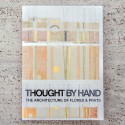































Author: Miquel Adrià (Editor)
Publisher: Arquine
Size: 21 x 30,5 x 4,5 cms
Pages: 448
Illustrations: Color & B&W
Cover: Softcover
Publication date: 2020, Second reprint
ISBN: Spanish 9786077784746
ISBN: English 9786077784753
Choose language:

First book documenting the work of Flores & Prats, an architecture studio founded in 1998 by Ricardo Flores and Eva Parts, that combines working on projects and constructions with a busy academic schedule at various universities. Ricardo Flores and Eva Prats, after an experience in the study of Enric Miralles, together develop a career where research is always linked to the responsibility to do and build, in an interest that projects are made, manufactured and can participate of the freedom of interpretation that the constructed work gives.
The book reflects the essence of its authors by displaying their design processes that range from sketches and drawings to detailed models of each one of their projects. It compiles works including renovations, social housing, public spaces, neighborhood participation, and university workshops. It includes its most well-known projects, such as the Museum of the Mills, the Nave Yutes, the Plaza Pío XII, the Casal Balaguer, the Microsoft Campus, the 111 Building or the Sala Beckett Theater, but also research on mobile or portable projects such as the Casa in a Suitcase and the Jeweler Mireia, his experiences in the use of the film to document the architecture, or his more recent menus of edible architecture, developed for the exhibitions of his work in Barcelona and Copenhagen.
Texts written by Miquel Adrià, Manuel de Solà-Morales, Adrià Goula, Toni Casares, Soraya Smithson and Miralda, and a critical essay by Juan José Lahuerta.
PENSADO A MANO / THOUGHT BY HAND
"In the homogeneous world in which tools are weapons that only useful to make instant, clean breaks, Flores & Prats's work, by contrast, takes its time and lingers in an unarmed experience: for them the tool is shaped by the hand, and the work by the hand and by the tool, in a continuous process. Their work seems to be opposed to making any cuts, and eschews dramatic flourishes, even though circumstances have generally pushed it to the margins, to a no-man's land and to the peripheries, in other words, to places were the cut seems unavoidable, irreparable. Their work seems to confirm that you can only build up experience by tying and untying. Making and using: one thing transforms the other, and vice-versa."
Juan José Lahuerta